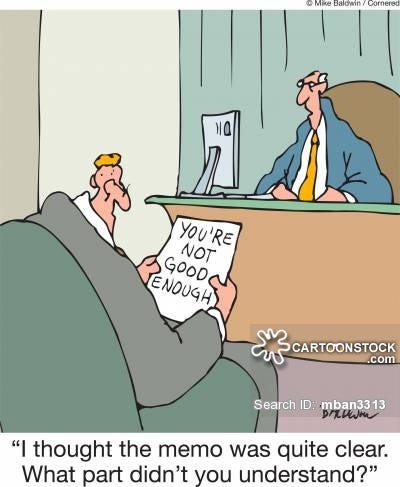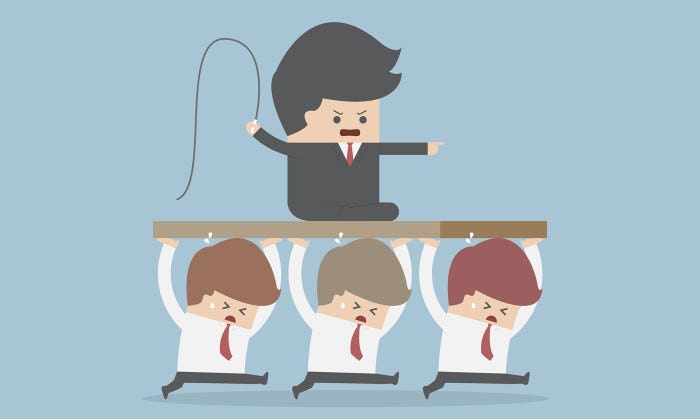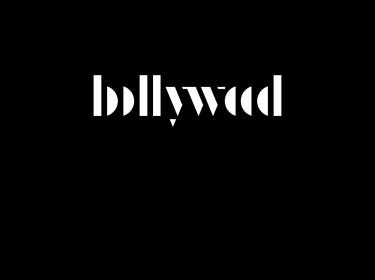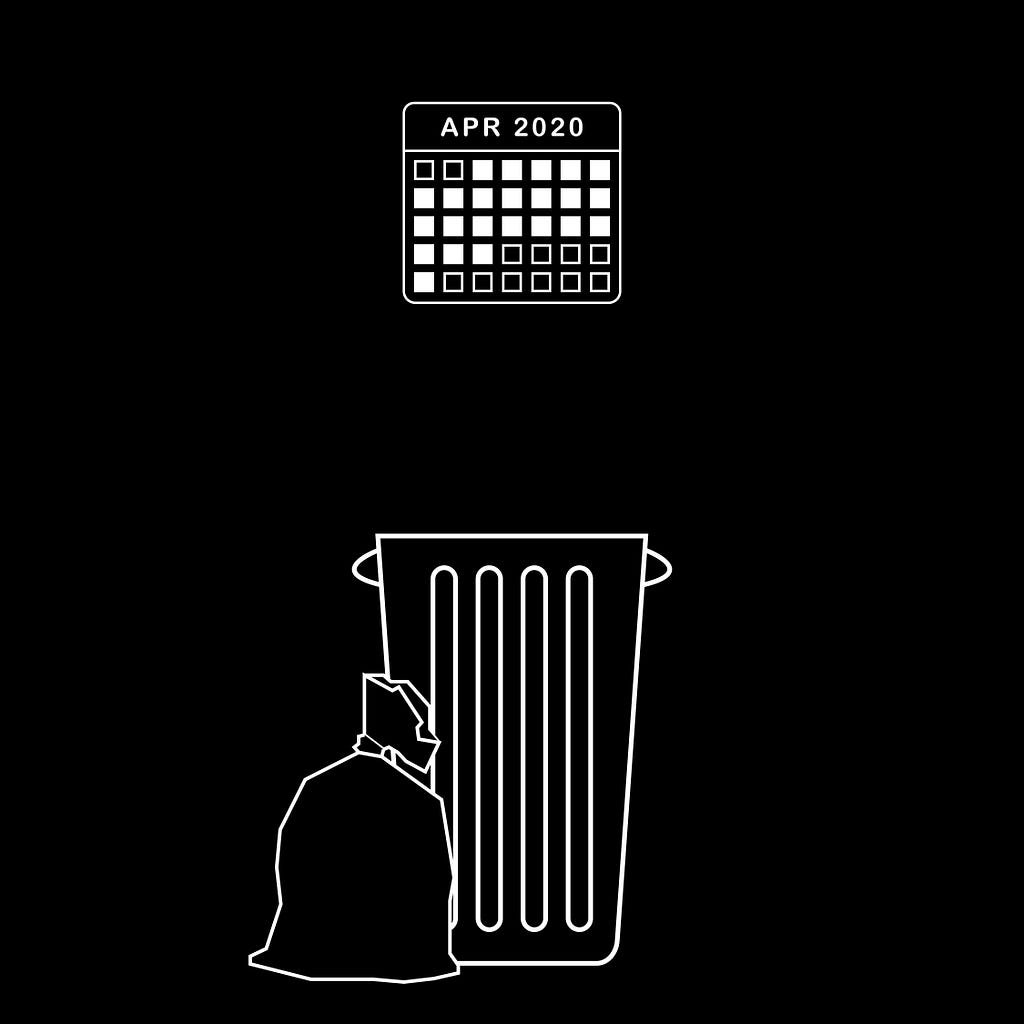|
|

GMAT Club Daily Prep
Thank you for using the timer - this advanced tool can estimate your performance and suggest more practice questions. We have subscribed you to Daily Prep Questions via email.
Customized
for You
Track
Your Progress
Practice
Pays
Not interested in getting valuable practice questions and articles delivered to your email? No problem, unsubscribe here.
bschooladmit20
Kudos
Bookmarks
| FROM Bschooladmit20: Thank you! So glad you enjoyed it |
|
Thank you! So glad you enjoyed it ? |
This Blog post was imported into the forum automatically. We hope you found it helpful. Please use the Kudos button if you did, or please PM/DM me if you found it disruptive and I will take care of it.
-BB
bschooladmit20
Kudos
Bookmarks
| FROM Bschooladmit20: The Idiot’s Guide To Being a Bad Manager |
 Have you been feeling burnt out or stressed lately? Do you hate your job? Forget those self-help books. Consider taking out your frustration on your team instead. It’s much easier- and surprisingly therapeutic- to make their lives a living hell. Here’s how you can punish them for working for you: 1. Act like everything is urgent Pretend that the company has no priorities. Expect them to do everything at once. Set unrealistic timelines. Get frustrated when they’re missed, or if your team drops the ball on the most minute tasks. Get even more hassled when they don’t spend time on the right priorities in the first place. Tell them that you have limited bandwidth, and it’s unreasonable for them to ask you questions or review their work at every stage, for every project. Why can’t they prioritize better? 2. Keep changing the team’s strategy and direction Ideally, you shouldn’t set any direction at all. Don’t set team or individual goals. Better yet, don’t define their roles. Give them ad-hoc work through the year. Keep it coming, and ask them to continuously work harder and faster, with no breaks. When they burn out, question their ability to execute on the next important project. If they ask about the company or team’s strategy, tell them that you’re going to keep trying to do everything. Then reluctantly, set some unreachable goals for the year. Mid-way through the year, change your team’s direction without warning. If you really want to toy with them, don’t tell them you’ve changed your mind until they’ve already done the work. Keep them guessing. 3. Keep your communication vague Don’t articulate deliverables or timelines or show them what ‘good’ looks like. Get angry when they don’t understand what you mean, or are unable to complete a task, but don’t allow them to ask questions. Expect them to read your mind instead. When they update you, respond to the most insignificant point. Answer their questions with more questions. From time to time, simply ignore them. When they follow up, act confused or busy. On the other hand, set a high standard for communication from their end: demand precision, and pick on the slightest inconsistency. Ask them how they plan to succeed if they can’t communicate effectively. 4. Pretend you’re never wrong Hold them to an impossible standard, and humiliate them in public for their mistakes: but don’t apologise when you get it wrong. Showing humility is a sign of weakness. Instead, blame them for your mistakes. If they give you feedback, tell them they’re wrong. Question their loyalty, and tell them that everyone in the company questions their attitude. Tell them to complain less, and work harder. 5. Take credit for their work Offer to lead every single project, and then step away, when the real work kicks in. Tell them you’re busy, and they should step up and learn to lead. If they fail, let them take the fall. It’s not your job to protect them: they need to toughen up. If they do manage to execute, take credit for their work. Ensure you are the face of all successful projects externally. Don’t thank or acknowledge your team when interacting with other teams or external stakeholders. Instead, put them down in front of other employees. Act like you manage to do a phenomenal job while still having a weak team, because you’re just that good. 6. Micromanage their time Don’t waste your time getting to know them. Their hopes, dreams and fears are meaningless. Instead of understanding, supporting and guiding them, micromanage their time. Don’t help set up any structure or processes or help with execution: just focus on the time your employees spend at work. Ensure they come in early, and leave late. Ask why them why they don’t work on weekends. Make them regret asking for leaves: work from homes are obviously out of the question. Face-time matters. 7. Don’t reward talent Don’t reward great work: or even acknowledge it. They’re just doing their job, after all. If you’re really forced to, offer them a bonus or raise. Then change your mind at appraisal time, without acknowledging the shift in stance. When they ask you what happened, ask them why they don’t have more empathy for the organisation’s needs. Why are they so self-centred? Isn’t doing great work enough for them? Remind them how lucky they are to work for you in the first place. Threaten to reduce or cut their role if they’re not more grateful. Insecure employees are easier to manage- and less likely to leave. You don’t want to nurture talent: you’re the star here, not them. Enjoy your reign of fear. Hopefully, you’ll end up scarring your employees to such an extent, that they’ll begin to believe this is normal. Good luck! The Idiot’s Guide To Being a Bad Manager was originally published in Hacker Noon on Medium, where people are continuing the conversation by highlighting and responding to this story. |
This Blog post was imported into the forum automatically. We hope you found it helpful. Please use the Kudos button if you did, or please PM/DM me if you found it disruptive and I will take care of it.
-BB
Kudos
Bookmarks
| FROM Bschooladmit20: The Bad Boss Guide: How to Scar Your Employees |
 Have you been feeling burnt out or stressed lately? Do you hate your job? Forget those self-help books. Consider taking out your frustration on your team instead. It’s much easier- and surprisingly therapeutic- to make their lives a living hell. Here’s how you can punish them for working for you: 1. Act like everything is urgent Pretend that the company has no priorities. Expect them to do everything at once. Set unrealistic timelines. Get frustrated when they’re missed, or if your team drops the ball on the most minute tasks. Get even more hassled when they don’t spend time on the right priorities in the first place. Tell them that you have limited bandwidth, and it’s unreasonable for them to ask you questions or review their work at every stage, for every project. Why can’t they prioritize better? 2. Keep changing the team’s strategy and direction Ideally, you shouldn’t set any direction at all. Don’t set team or individual goals. Better yet, don’t define their roles. Give them ad-hoc work through the year. Keep it coming, and ask them to continuously work harder and faster, with no breaks. When they burn out, question their ability to execute on the next important project. If they ask about the company or team’s strategy, tell them that you’re going to keep trying to do everything. Then reluctantly, set some unreachable goals for the year. Mid-way through the year, change your team’s direction without warning. If you really want to toy with them, don’t tell them you’ve changed your mind until they’ve already done the work. Keep them guessing. 3. Keep your communication vague Don’t articulate deliverables or timelines or show them what ‘good’ looks like. Get angry when they don’t understand what you mean, or are unable to complete a task, but don’t allow them to ask questions. Expect them to read your mind instead. When they update you, respond to the most insignificant point. Answer their questions with more questions. From time to time, simply ignore them. When they follow up, act confused or busy. On the other hand, set a high standard for communication from their end: demand precision, and pick on the slightest inconsistency. Ask them how they plan to succeed if they can’t communicate effectively. 4. Pretend you’re never wrong Hold them to an impossible standard, and humiliate them in public for their mistakes: but don’t apologise when you get it wrong. Showing humility is a sign of weakness. Instead, blame them for your mistakes. If they give you feedback, tell them they’re wrong. Question their loyalty, and tell them that everyone in the company questions their attitude. Tell them to complain less, and work harder.5. Take credit for their work Offer to lead every single project, and then step away, when the real work kicks in. Tell them you’re busy, and they should step up and learn to lead. If they fail, let them take the fall. It’s not your job to protect them: they need to toughen up. If they do manage to execute, take credit for their work. Ensure you are the face of all successful projects externally. Don’t thank or acknowledge your team when interacting with other teams or external stakeholders. Instead, put them down in front of other employees. Act like you manage to do a phenomenal job while still having a weak team, because you’re just that good. 6. Micromanage their time Don’t waste your time getting to know them. Their hopes, dreams and fears are meaningless. Instead of understanding, supporting and guiding them, micromanage their time. Don’t help set up any structure or processes or help with execution: just focus on the time your employees spend at work. Ensure they come in early, and leave late. Ask why them why they don’t work on weekends. Make them regret asking for leaves: work from homes are obviously out of the question. Face-time matters. 7. Don’t reward talent Don’t reward great work: or even acknowledge it. They’re just doing their job, after all. If you’re really forced to, offer them a bonus or raise. Then change your mind at appraisal time, without acknowledging the shift in stance. When they ask you what happened, ask them why they don’t have more empathy for the organisation’s needs. Why are they so self-centred? Isn’t doing great work enough for them? Remind them how lucky they are to work for you in the first place. Threaten to reduce or cut their role if they’re not more grateful. Insecure employees are easier to manage- and less likely to leave. You don’t want to nurture talent: you’re the star here, not them.Enjoy your reign of fear. Hopefully, you’ll end up scarring your employees to such an extent, that they’ll begin to believe this is normal. Good luck! The Bad Boss Guide: How to Scar Your Employees was originally published in Hacker Noon on Medium, where people are continuing the conversation by highlighting and responding to this story. |
This Blog post was imported into the forum automatically. We hope you found it helpful. Please use the Kudos button if you did, or please PM/DM me if you found it disruptive and I will take care of it.
-BB
















